|
|
|
Sort Order |
|
|
|
Items / Page
|
|
|
|
|
|
|
| Srl | Item |
| 1 |
ID:
159797
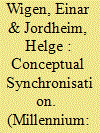

|
|
|
|
|
| Summary/Abstract |
International order is also temporal order, based on the alignment, more precisely, the synchronisation of the multiple times at work on a global scale. Synchronicity between cultures, languages, and polities does not emerge by itself. To create temporal orderings on a global scale requires work: political, social, and linguistic. Some work of synchronisation is performed by technological innovations such as clocks, trains, telegraph lines, phones, satellites etc. Another set of tools, however, is linguistic, made up by concepts used to make historical and political time understandable and workable. Concepts are used to order events, objects and polities temporally, thus making both them and their temporality aspects of international order. By drawing together experiences, events, and meanings from different knowledge fields or cultures, they synchronise them, aligning their speeds, rhythms, and durations. One of the most central concepts that have been used in synchronisation over the past two centuries is progress. In this article we map out how it has synchronised temporalities on a global scale, and ask whether progress is in the process of being replaced by the concept of crisis as the main tool for synchronising temporalities in international society – using examples from political and administrative rhetoric as well as anthropological studies.
|
|
|
|
|
|
|
|
|
|
|
|
|
|
|
|
| 2 |
ID:
159791
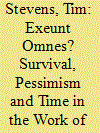

|
|
|
|
|
| Summary/Abstract |
John H. Herz (1908-2005) is better known for his theorisation of the security dilemma than for his conviction that human survival is threatened by the conditions of late modernity. This article explores extinction and survival in his work to interrogate his persistent characterisation as an incorrigible pessimist. In his preoccupation with extinction, Herz would seem a first-rank pessimist, but his intellectual commitments belie this easy categorisation. Specifically, his appeals to interdisciplinary ‘survival research’ suggest a qualified pessimism that does not foreclose on the potential of humankind to overcome structural, political and normative obstacles. This is consistent with current understandings of pessimism within the broader realist tradition. Herz expressed an ‘open’ and ‘linear’ temporality that challenges cyclical and linear-progressive temporalities inherent to realism and liberalism, respectively. Herz articulates, therefore, a ‘productive pessimism’ that charts a different path for pessimist thought beyond its pejorative connotations. This article contributes to the literature on classical realism, to a growing interest in Herz’s intellectual legacy, and to the developing appreciation of time and temporality in International Relations theory and practice. It also provides a foundation for rethinking our assumptions about pessimism and international politics.
|
|
|
|
|
|
|
|
|
|
|
|
|
|
|
|
| 3 |
ID:
159795


|
|
|
|
|
| Summary/Abstract |
Michel Foucault’s concept of governmentality is widely used throughout the social sciences to analyse the state, liberalism, and individual subjectivity. Surprisingly, what remains ignored are the repeated claims made by Foucault throughout his seminal Security, Territory, Population lectures (2007) that governmentality depends more fundamentally on a specific form of time, than on the state or the subject. By paying closer attention to Foucault’s comments on political temporality, this article reveals that governmentality emerged from, and depends upon, a very specific cosmological order that experiences time as indefinite: what Foucault calls our modern ‘indefinite governmentality’. This is elaborated here in three ways. First, by reviewing the transformation from a linear Christian cosmology to our modern indefinite governmentality through what Foucault calls the ‘de-governmentalization of the cosmos’. Second, by arguing that our experience of indefinite temporality was concretised by the geological discovery of ‘deep time’. Third, by engaging a contemporary geological concept that returns humanity to its lost cosmological centrality, thereby re-governing the cosmos: the Anthropocene, or the ‘human epoch’. Analysed using indefinite governmentality, Foucault’s forewarning of an ‘end of history’ is implicit in the new concept of the Anthropocene’s origins and ends. If it is the paradigm shift its proponents claim, then it threatens to end the temporality of the state, the subject, and governmentality itself.
|
|
|
|
|
|
|
|
|
|
|
|
|
|
|
|
| 4 |
ID:
159793
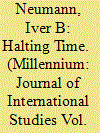

|
|
|
|
|
| Summary/Abstract |
Drawing on identity and prototype theory, the article sets out to analyse the historically dominant monumentalising ways in which polities try to shore up their own Selves by halting their Others in time. The first part of the article discusses how monuments represent Self/Other relations from ancient Mesopotamia in the East to modern Britain in the West by limning off a constitutive outside, be that as visual absence or presence. Temporality is of the essence here, with the basic idea being that the Self is in temporal motion, while the Other is literally petrified. I then postulate that the Other is halted in time in three basic ways: as visual absence, as dead and as subjugated. Crucially, however, the Second World War is actually the end point of the extraordinary stability of monumental ways in which to represent the Other. We see the tentative emergence and damning of a fourth Other, namely a previous incarnation of the Self. I conclude, with Norbert Elias, that the fading away of the Other as dead and as subjugated is significant as part of a civilisation process that works against denying the Other its future agency.
|
|
|
|
|
|
|
|
|
|
|
|
|
|
|
|
| 5 |
ID:
159790
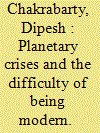

|
|
|
|
|
| Summary/Abstract |
This article questions whether the presently dominant ideas about globalisation and global warming work with very different conceptions of the ‘globe’ that are both connected and yet opposed to each other. The discussion on globalisation may be seen as an extension of homocentric narratives of modernity that see humans as separate from the natural world. The global warming literature, on the other hand, has led to a serious renewal of critical calls to abandon the nature/culture distinction. This article tracks some of the ethical difficulties of being modern at a time when collective human aspirations carry planetary implications. In the process, the article brings into conversation some post-human and post-colonial perspectives on our time.
|
|
|
|
|
|
|
|
|
|
|
|
|
|
|
|
| 6 |
ID:
159788
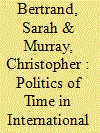

|
|
|
|
|
| Summary/Abstract |
Have we returned to an age of extremes? Have Brexit, Trump, and the rise of nationalist populism sounded the death knell for liberal democracy’s promise of progress? Do tensions between the West, Russia and China constitute a new Cold War? Considering the global politics of Syria, militant Islam and the rise of the formerly-colonised world, can we speak of one present with different political groups aspiring to the same future?
|
|
|
|
|
|
|
|
|
|
|
|
|
|
|
|
| 7 |
ID:
159794


|
|
|
|
|
| Summary/Abstract |
Haiti, Liberia and Ethiopia existed precariously, between the world wars, on the edges of an international order dominated by Europe. The only independent states at the League of Nations governed by people of African descent,1 each faced an incursion that effectively vitiated its legal sovereignty. Haiti was occupied by the United States from 1915 to 1934. Ethiopia was occupied by Italy from 1936 to 1941. Liberia was placed under financial receivership, formally investigated by the League and threatened with occupation between 1929 and 1936. Peripheral to the international society which sought to extinguish them, they became central to global, and especially pan-African, anticolonialism. Many participants in anticolonial movements across Africa and the Caribbean after 1945 had been deeply affected by a political and theoretical engagement with the interwar experiences of these states. The outcomes of interwar political developments in Haiti, Liberia and Ethiopia were widely seen, by both their supporters and detractors, to have major ramifications for the colonised world, especially the African continent and diaspora. It is surprising, then, that comparative studies of these states have been so rare in modern scholarship.
|
|
|
|
|
|
|
|
|
|
|
|
|
|
|
|
| 8 |
ID:
159792


|
|
|
|
|
| Summary/Abstract |
Recently, more and more International Relations (IR) scholars have begun to recognise time explicitly as a political phenomenon and an important element of IR theorising. Spanning different approaches and substantive concerns, their efforts suggest that IR is taking a ‘temporal turn’. This is most evident in the field’s critical wing, which has expanded our perspective on time and challenged temporalities associated with sovereign politics and mainstream theories. However, critical treatments of time also manifest four discursive habits – two targets of criticism and two alternatives – that reproduce hidden tensions and contradictions detrimental to the temporal turn. First, scholars incoherently denounce timeless visions of politics. Second, attacks on linear time obscure a variety of hegemonic temporalities and reproduce assumptions that critics wish to challenge. Third, advocates of heterotemporality amass woolly alternatives, foreclosing analysis and dialogue. Finally, times of rupture recapitulate a liberal-idealism that depoliticises temporal enquiry just when it could be pushing the politics of time further. These habits hamstring conceptual development and critical IR’s ability to contribute distinctive perspectives to a field growing increasingly interested in time. To redress this, the paper identifies and sharpens critical IR’s temporal tensions, shows how they encourage particular visions of time and politics, and suggests initial steps towards maximising the critical potential of time.
|
|
|
|
|
|
|
|
|
|
|
|
|
|
|
|
| 9 |
ID:
159789
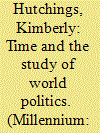

|
|
|
|
|
| Summary/Abstract |
The articles in this volume, and the many contributions to the Millennium Conference, ‘The Politics of Time in International Relations’ from which these articles were drawn, speak to the ongoing interest in issues of time and temporality in International Relations (IR) and associated disciplines. They also speak to the very broad range of ways in which time and temporality are seen to operate in international politics and the ways in which it (international politics) is studied and judged. I was deeply interested in and stimulated by my participation in the conference, and what follows is an attempt to situate my own specific concerns on issues of time and temporality, when I wrote Time and World Politics and subsequently, in the broader context of the developing literature on time and temporality in IR. Like most of the contributors to this volume, I see the attention paid to issues of time/temporality in IR as productive for research in the field. However, in agreement with at least two of the contributors, I am also aware that like any other production of academic knowledge, including supposedly ‘critical’ academic knowledge, there are always dangers and limitations inherent in that knowledge and its discursive and practical effects.
|
|
|
|
|
|
|
|
|
|
|
|
|
|
|
|
| 10 |
ID:
159796


|
|
|
|
|
| Summary/Abstract |
Recent studies dedicated to time in IR often begin with the claim that the field has long relegated time to a background position, and only recently begun taking the concept seriously, with many fruitful insights. In this article, I refuse this interpellation to ‘take time seriously’, instead proposing we read these claims as part of a discourse, that is, a set of regularities through which we organise and distribute time as an object of knowledge in IR, and through which we come to govern ourselves and others. First, by engaging works of the ‘temporal turn’, I describe four procedures through which the discourse of time in IR is organised: opposing conceptual fields, scaling objects, naturalising and repressing desires, and strategic inverting. Second, I argue this reading shows that the temporal turn might ultimately fall short of realising its proclaimed aims. However, and third, I propose we take this not as a failure, but as the effective working of the discourse. Fourth, in doing so, I suggest the discourse of time effectively ‘changes the subject’ in terms of both the problems posed and the subjectivities constituted in relation to them – in the field of IR, but possibly also more broadly.
|
|
|
|
|
|
|
|
|
|
|
|
|
|
|
|
|
|
|
|
|